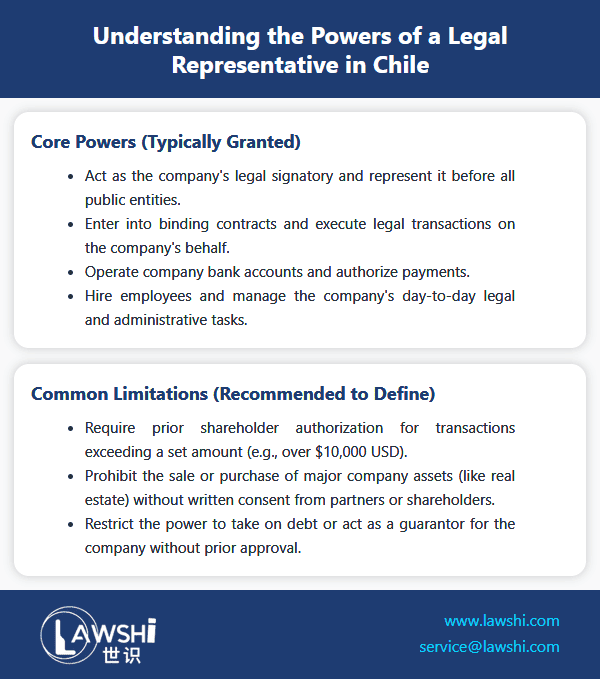The appointment of a legal representative constitutes a fundamental requirement for establishing and operating corporate entities in Chile. This role carries significant responsibilities and authority, making the selection process crucial for both compliance and operational effectiveness. Chilean legislation mandates specific qualifications for individuals serving in this capacity, while granting them broad powers to act on behalf of the companies they represent.
When Legal Representation Becomes Necessary
The requirement for legal representation arises at the earliest stages of company formation in Chile. From the moment of incorporation, companies must designate an individual meeting specific residency and qualification standards to act as their legal representative. This appointment remains in effect throughout the company's operational lifecycle, with changes requiring formal documentation and registration.
【Lawshi Professional Insight】
The legal representative requirement in Chile serves multiple purposes beyond mere compliance. It establishes clear accountability for corporate actions and provides tax authorities and regulatory bodies with a designated contact person within Chilean jurisdiction. This requirement underscores the importance of selecting representatives who combine legal knowledge with business acumen.
The specific procedural milestones requiring legal representative involvement include the formal signing of company bylaws before a public notary, obtaining the company tax identification number (RUT), and securing municipal business licenses. Each of these steps demands the physical presence or formal authorization of the appointed representative, highlighting the practical necessity of having a resident representative in Chile.
Qualification Requirements for Legal Representatives
Chilean law establishes clear parameters for individuals eligible to serve as legal representatives. The fundamental requirements include being at least 18 years of age and either holding Chilean citizenship or maintaining permanent residency status. The appointment must be formalized through a public deed, creating a verifiable record of the representative's authority.
【Lawshi Practical Tip】
Foreign investors should note that obtaining permanent residency in Chile typically requires significant processing time. We recommend initiating visa applications well in advance of planned company incorporation to avoid delays. Alternatively, working with established professional representatives during the initial establishment phase can provide immediate compliance while longer-term arrangements are finalized.
Corporate entities cannot serve as legal representatives for other companies, ensuring that responsibility remains with identifiable individuals. This requirement personalizes accountability and ensures that regulatory authorities can engage with human representatives rather than corporate structures when necessary.
Scope of Authority and Responsibilities
The legal representative's authority encompasses comprehensive representation across all governmental and regulatory interfaces. This includes interactions with tax authorities, commercial registries, municipal governments, and other public entities. The representative acts as the company's formal interface with the Chilean regulatory ecosystem.
Operational authorities granted to legal representatives typically include execution of legal transactions, banking operations, and asset management. The ability to open and operate company bank accounts, authorize payments, and conduct asset transactions represents significant financial authority that requires careful oversight and control mechanisms.

【Lawshi Exclusive Service】
Our firm provides professional legal representation services that combine regulatory compliance with robust oversight mechanisms. We implement structured authorization protocols that maintain operational control with company principals while ensuring full compliance with Chilean representation requirements. Our approach includes regular reporting and clear limitation frameworks that protect client interests.
Strategic Considerations for Representation Arrangements
The selection of a legal representative involves balancing multiple factors including trust, expertise, availability, and understanding of the company's business objectives. Many international companies initially appoint professional service providers as representatives during the establishment phase, transitioning to internal appointments as local operations mature and suitable candidates are identified.
The legal representative's potential personal liability for corporate actions necessitates careful consideration of risk management strategies. Implementing clear internal controls, maintaining thorough documentation, and establishing decision-making protocols helps protect both the company and the representative from unintended consequences.
Ongoing Compliance and Relationship Management
The relationship between a company and its legal representative requires ongoing management beyond the initial appointment. Changes in representation must follow formal procedures including new public deeds and updated registrations with relevant authorities. Regular review of the representative's authorities ensures alignment with evolving business needs and risk management priorities.
Chile's regulatory framework continues to evolve, with increasing emphasis on transparency and accountability for legal representatives. Maintaining current knowledge of regulatory changes and adapting representation arrangements accordingly represents an important aspect of sustainable corporate governance in the Chilean market.
The role of legal representative in Chile combines statutory requirements with strategic importance, making careful selection and ongoing management essential components of successful market entry and operation. By understanding the full scope of responsibilities and implementing appropriate oversight mechanisms, companies can leverage this requirement to establish strong compliance foundations while maintaining effective operational control.
